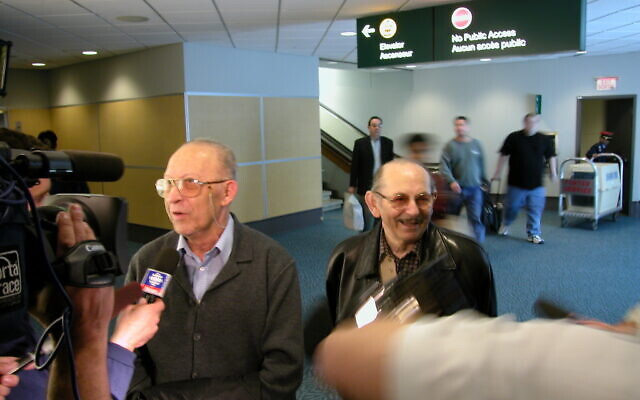
Groundbreaking testimony of ‘Mengele twin’ on Birkenau atrocities to be revealed
Previously unseen testimony providing a unique glimpse at the Nazi atrocities committed at the Birkenau death camp, given from the vantage point of a Jewish witness posted in a camp guard tower, will be released on Thursday — Israel’s Holocaust Remembrance Day.
The testimony of “Mengele twin” Kalman Bar-on will be revealed by Richard K. Lowy, a Jewish Canadian and the son of Holocaust survivor Leopold Lowy — another twin who was subjected to the notorious SS doctor Josef Mengele’s gruesome human experiments at Birkenau’s Hospital Camp, or medical barracks, during the Holocaust. Lowy will deliver the testimony at the Enav Cultural Center in Tel Aviv.
Richard Lowy was on a decade-long mission to preserve his father’s recollections as Canada’s last surviving “Mengele twin” when his efforts yielded an unforeseen link to Bar-on in Israel.
After an over 56-year separation, the survivors had an emotional reunion in 2002. Bar-on credited Leopold Lowy with saving his life.
Leopold Lowy died several months after their 2002 meeting. Before his death in 2019, Bar-on gave Richard Lowy over 12 hours of detailed recordings of his memories and experiences in the death camp.
“Kalman describes in graphic detail how he and my father were placed in the guard towers to serve the troops,” Lowy tells The Times of Israel. “They were able to look over the guard’s shoulders and see everything going on from that vantage point — the selections, the Gypsy camp, the transports, the uprisings.”
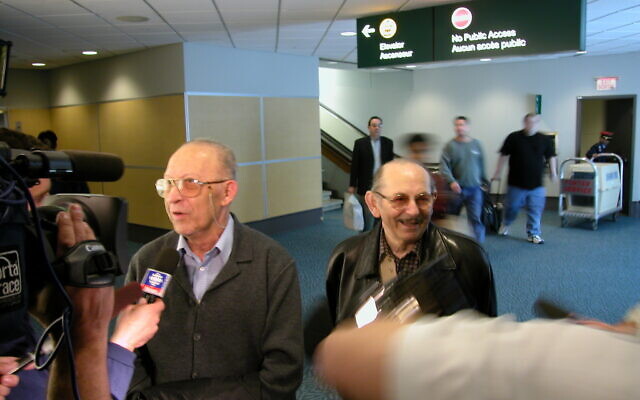
Kalman Bar-on, left, and Leopold Lowy at their reunion in 2002. (Courtesy Richard Lowy)
Bar-on said the crematorium was just 150 yards (137 meters) to their left, from where the two boys could hear screaming.
“A relationship developed between my dad, who was a streetwise kid, and Kalman, a yeshiva boy,” says Lowy. “They came together and looked out for each other and stole food together.”
According to Bar-on’s testimony, the boys served in the camp guard tower for a six-and-a-half-month period, during which they had a clear view of the atrocities taking place below.
“I will try to paint this map of fear, pointing out the difference between fear from the paws and boot of Sgt. Fritsche Fritz or any of the other SS Guards, the palpable fear for our lives when witnessing a delivery of the next batch of walking skeletons to the crematorium, the ice-cold grab in my chest when I am lying on the stone table during the periodic medical checks of Mengele, and the ever-present knowledge, that no one, but no one, will survive and emerge from Birkenau,” begins Bar-on’s testimony, which will be presented during a Holocaust Remembrance Day program in Tel Aviv.
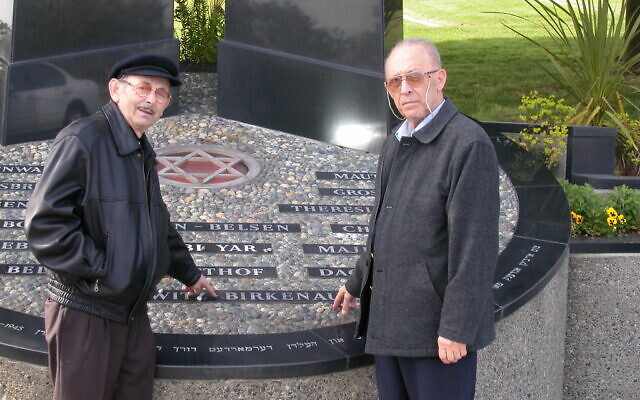
Leopold Lowy, left, and Kalman Bar-on at a Holocaust memorial. (Courtesy Richard Lowy)
Transported to Nazi-occupied Poland from a Hungarian yeshiva, or religious seminary, shortly after his bar mitzvah at the age of 13, Bar-on came face-to-face with the chilling reality of Nazi Germany’s systematic mass-murder machine even before he arrived at Birkenau.
“Close your eyes and consider a formal local ordinance, backed by the major legislature of your federal government, and the city, ordering all residents of your faith to gather in several designated streets of the city… 48 hours from now. Each adult and child may only have one suitcase in his or her hands,” Bar-on says in his testimony.
The testimony closely details Bar-on’s relationship with Leopold Lowy, also known as Lippa.
“I worked with my friend, Lippa, in the SS guard shack,” Bar-on says in the recordings. “Every morning at 5:15 we begin our day of servant work. Lippa, who is my age — the sun of my soul, my best and beloved friend, this is how I have been talking to him for many years, but he does not reply. I have been looking for Lippa for 56 years.
“Lippa saved me from beatings and looked out for me. But I knew very little about him. January 1945, the Russian army overtook Birkenau, and we were free to go. Lippa and I parted without much ado. It is part of Birkenau. It was part of life. Lippa went that way, and I this way. And where is Lippa today? Nobody knows because he’s not Lippa. Lippa is a nickname. He’s someone else,” relates Bar-on.
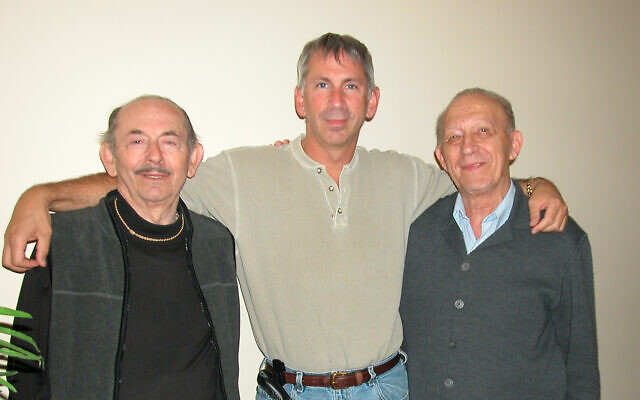
From left: Leopold Lowy, Richard Lowy, Kalman Bar-on. (Courtesy Richard Lowy)
Lowy was astounded by the detail of Bar-on’s account as compared to his father, who, he says, “at a certain point tended to repeat the same five stories, and that’s about it.”
Lowy calls Bar-on’s testimonial “a unique chronicle of daily life in the Birkenau Hospital Camp.”
“Kalman is not only a victim of Mengele’s twin experiments and a survivor, he’s an inquisitive observer with a keen eye for detail and a direct eyewitness to not only the things that happened to him but also things happening around him,” Lowy says.
“He has an uncanny ability to detach himself to record each moment, so decades later he can accurately recount his harrowing journey,” he says.
Lowy says he knew nothing about his father’s experiences in the Holocaust until after his father’s twin sister Miriam died in 1999. It was never spoken of in his home.
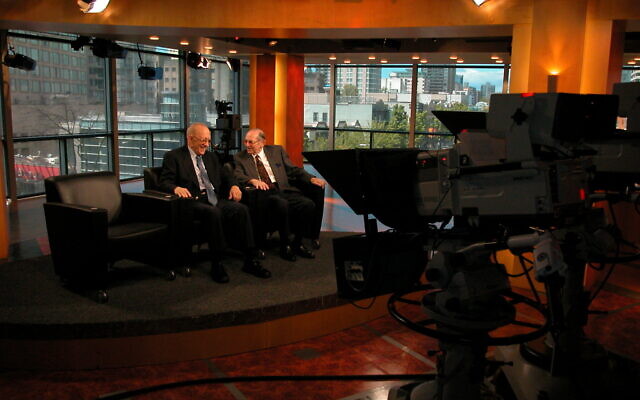
Kalman Bar-on, left, and Leopold Lowy on Canadian news in 2002. (Courtesy Richard Lowy)
Leopold and Miriam Lowy both survived Birkenau and were rescued by Allied soldiers during the death march from Auschwitz. The 15-year-old twins were later transferred to the care of a Canadian family in Halifax and then to Vancouver. Everyone in their family, and indeed everyone they knew from home, had perished in the Holocaust. They were among only four survivors from their hometown Berehove (Beregszasz), in what was then Hungary and is today Ukraine.
When he began to delve into his family history, Lowy was not even aware that in 1985 his father had given 38 minutes of testimony to the US Holocaust Memorial Museum’s Steven Spielberg Film and Video Archive preserving survivors’ accounts.
Lowy has since memorized the entire testimony, which he has repeated verbatim in the first-person at educational and memorial programs about the Holocaust. He gets into character as his father for the testimony, and says that “after the programs, people sometimes approach me and say they are sorry for what I went through. I must remind them that they were my father’s memories and not mine.”
Father and son traveled together in 2000 to film “Leo’s Journey: The Story of the Mengele Twins.”
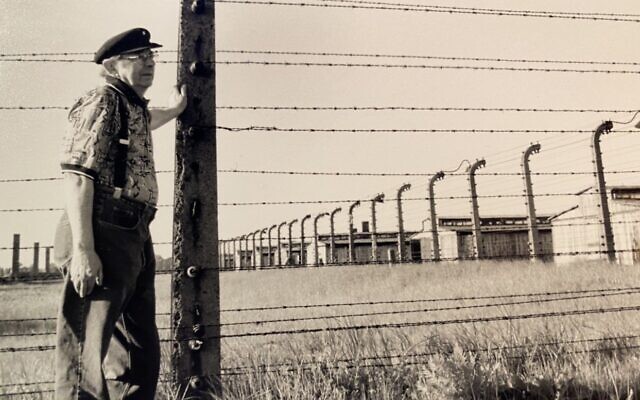
Leopold Lowy revisits Auschwitz-Birkenau in this undated photo. (Courtesy Richard Lowy)
Lowy produced the film which documented his father’s visit to see his former home in Berehove, the cattle cars on which the Jews were transported, and the remains of Auschwitz and the nearby Birkenau camp hospital in Poland.
The documentary was broadcast on Israeli television in 2001 and happened to be viewed by Bar-on, who lived in Israel.
Bar-on recognized Leopold and his twin sister Miriam Lowy from photos of them as children that were included in the film. He was eager to find his friend who shared his experiences from 56 years earlier, whom he knew only as Lippa.
Bar-on contacted “his Lippa” and the two survivors had an emotional reunion in Vancouver in 2002 that included extensive media coverage in Canada. Leopold Lowy died later that same year.
At 19:00 on April 28, Israel Philharmonic violinist Ori Wissner-Levy will join Richard K. Lowy for a lecture, performance and screening of the film “Leo’s Journey: In My Father’s Words” at Tel Aviv’s Enav Cultural Center.
